Talent Connected Worldwide is a prominent immigration company that specializes in providing comprehensive services to individuals and families seeking to relocate to different countries for work, study, or personal reasons.
Don't wanna be here? Send us removal request.
Text
Unlocking Canada: Immigration Hacks for Success

Canada, with its breathtaking landscapes, vibrant cities, and welcoming culture, has long been a magnet for individuals seeking new opportunities and a better quality of life. Whether you're drawn to Canada for work, study, or to reunite with family, navigating the immigration process can seem daunting. However, with the right knowledge and approach, you can significantly increase your chances of a successful Canada immigration journey. Here are some hacks and tips to help you unlock your path to Canada.
1. Know Your Options
Before diving into the immigration process, familiarize yourself with the various pathways available. Canada offers several immigration programs, including Express Entry for skilled workers, Provincial Nominee Programs (PNPs) for those with specific skills or connections to particular provinces, and family sponsorship programs. Each pathway has its requirements and criteria, so understanding which one aligns best with your situation is crucial.
2. Plan Ahead
Immigrating to Canada is a process that requires careful planning and preparation. Start gathering your documents early, including passports, educational credentials, language test results (such as IELTS or CELPIP for English proficiency or TEF for French), and work experience certificates. These documents will streamline your application process and demonstrate your eligibility more effectively.
3. Boost Your CRS Score
For those applying through the Express Entry system, your Comprehensive Ranking System (CRS) score significantly affects your chances of receiving an Invitation to Apply (ITA) for permanent residence. Maximize your CRS score by improving your language proficiency, gaining additional work experience, obtaining a Canadian job offer, or pursuing further education. Even a few extra points can make a difference in your ranking.
4. Leverage Provincial Nominee Programs
Provincial Nominee Programs (PNPs) allow Canadian provinces and territories to nominate individuals who meet their specific labor market and economic needs. Research which provinces have PNPs aligned with your skills and experiences. Some PNPs have lower CRS score requirements or offer faster processing times, making them attractive options for Canada immigration.
5. Utilize Settlement Services
Once you've received your immigration visa, settling into Canada smoothly is essential for your success and integration into Canadian society. Take advantage of settlement services offered by the government, non-profit organizations, and community groups. These services can provide valuable support with housing, job search, language training, and cultural orientation.
6. Network and Engage
Building a network in Canada can open doors to job opportunities, mentorship, and community connections. Attend networking events, join professional associations, and engage with local communities. Networking not only enhances your career prospects but also enriches your overall experience in Canada.
7. Stay Informed and Flexible
Immigration policies and procedures can change, so stay informed about updates from Immigration, Refugees, and Citizenship Canada (IRCC). Be prepared to adapt your plans if necessary and explore alternative pathways if your initial strategy faces challenges or delays.
8. Seek Professional Guidance
While navigating the immigration process on your own is possible, seeking guidance from immigration consultants or lawyers can provide valuable insights and ensure your application is accurate and complete. Choose reputable professionals who are licensed and experienced in Canadian immigration law.
Conclusion
Embarking on a journey to Canada through immigration requires determination, preparation, and a strategic approach. By knowing your options, planning, maximizing your eligibility, leveraging available resources, and staying informed, you can increase your chances of a successful Canada immigration experience. Canada's welcoming environment awaits those who are ready to embrace new opportunities and contribute to its diverse and thriving communities.
0 notes
Text
Navigating Your Canadian Immigration Roadmap

Canada, known for its natural beauty, diverse culture, and thriving economy, is a dream destination for many individuals seeking new opportunities and a higher quality of life. Whether you're considering immigrating to Canada for work, study, or to reunite with family, understanding the immigration process is crucial. In this guide, we'll outline the Canada immigration roadmap, providing you with the essential information to navigate your journey successfully.
1. Identify Your Eligibility
- Determine your eligibility for immigration based on factors such as age, education, work experience, language proficiency, and adaptability. The most common immigration pathways include Express Entry, Provincial Nominee Programs (PNPs), Family Sponsorship, and Study Permits.
2. Express Entry System
- Express Entry is a points-based system that manages applications for three federal economic immigration programs: the Federal Skilled Worker Program (FSWP), the Federal Skilled Trades Program (FSTP), and the Canadian Experience Class (CEC). Create an Express Entry profile, where you'll receive a Comprehensive Ranking System (CRS) score based on your qualifications. Higher CRS scores increase your chances of receiving an Invitation to Apply (ITA) for permanent residence.
3. Provincial Nominee Programs (PNPs)
- PNPs allow Canadian provinces and territories to nominate individuals who meet their specific labor market needs. Research and apply to the PNP(s) aligned with your skills and experience. Successful nomination can lead to faster processing and an enhanced chance of receiving permanent residency.
4. Family Sponsorship
- If you have a family member who is a Canadian citizen or permanent resident, they may be able to sponsor you for immigration. This pathway applies to spouses, partners, dependent children, parents, and grandparents. Ensure you meet the eligibility criteria and submit a complete sponsorship application.
5. Study Permits
- Pursuing education in Canada can be a pathway to permanent residency. Obtain a study permit by enrolling in a Designated Learning Institution (DLI) and meeting the necessary academic and language requirements. After completing your studies, you may qualify for a Post-Graduation Work Permit (PGWP) and subsequently apply for permanent residency through various programs.
6. Gather Required Documentation
- Compile essential documents such as identification, educational credentials, work experience certificates, language test results (e.g., IELTS, CELPIP), proof of funds, and any other documents specified by the immigration program you're applying to.
7. Submit Your Application
- Submit a complete and accurate application through the designated Canada immigration system or platform. Follow all instructions carefully and pay the required fees. Ensure you meet deadlines and provide any additional information or updates as requested by immigration authorities.
8. Undergo Medical and Security Checks
- After submitting your application, you may be required to undergo medical examinations and provide police certificates to prove your good character and health status. Cooperate fully with these requirements to facilitate the processing of your application.
9. Receive Confirmation and Take Necessary Steps
- Upon approval, you'll receive confirmation of your immigration status, whether it's permanent residency, a study permit, or a work permit. Follow any additional steps outlined by immigration authorities, such as landing procedures for permanent residents.
10. Settle in Canada
- Once you've arrived in Canada, take the necessary steps to settle in your new home. This includes obtaining a Social Insurance Number (SIN), opening a bank account, finding accommodation, and familiarizing yourself with Canadian laws and customs.
Remember, the Canadian immigration process can be complex, and requirements may vary based on the program and your circumstances. Consider seeking guidance from immigration consultants, lawyers, or authorized representatives to ensure a smooth and successful immigration journey.
In conclusion, embarking on your Canada immigration journey requires careful planning, thorough research, and adherence to immigration regulations. By following this roadmap and leveraging the available immigration pathways, you can turn your dream of living and working in Canada into a reality. Good luck on your journey to Canada!
0 notes
Text
2024 Guide: Your Complete Roadmap to Immigrating to Canada
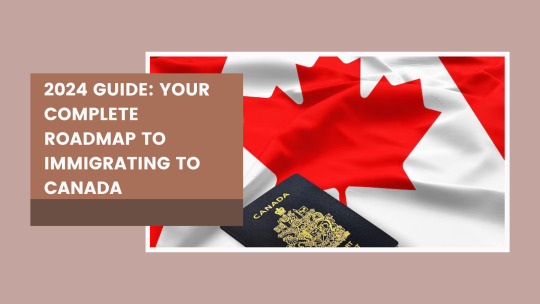
Are you considering making Canada your new home? Whether you're drawn to its stunning landscapes, diverse culture, or robust economy, immigrating to Canada can be a life-changing decision. However, navigating the Canada immigration process can seem daunting without the right guidance. That's why we've compiled this comprehensive guide to help you understand the steps involved and make your journey to Canada smoother and more manageable.
Why Immigrate to Canada?
Canada is renowned for its high quality of life, excellent healthcare and education systems, economic stability, and welcoming attitude towards immigrants. From bustling urban centers to serene rural communities, Canada offers many opportunities for individuals and families looking to start a new chapter in their lives.
Understanding Canada's Immigration Programs
Before diving into the application process, it's crucial to understand the various immigration pathways available in Canada. Here are some of the main programs:
1. Express Entry System: This system is for skilled workers who wish to become permanent residents of Canada. It includes the Federal Skilled Worker Program, Federal Skilled Trades Program, and Canadian Experience Class.
2. Provincial Nominee Programs (PNPs): Each Canadian province and territory has its own PNP, which allows them to nominate individuals with the skills and experience needed in their region.
3. Family Sponsorship: Canadian citizens and permanent residents can sponsor their family members, including spouses, children, parents, and grandparents, to immigrate to Canada.
4. Business Immigration: For entrepreneurs, investors, and self-employed individuals looking to contribute to Canada's economy, there are various business immigration programs available.
Steps to Immigrate to Canada
Now that you have an overview of the Canada immigration programs, let's break down the steps you need to follow to immigrate to Canada:
1. Assess Your Eligibility: Determine which immigration program suits your qualifications, experience, and goals. You may also consider consulting an immigration consultant or lawyer for personalized advice.
2. Gather Required Documents: Depending on the program you're applying for, you'll need to gather documents such as educational credentials, work experience proof, language proficiency test results (e.g., IELTS), and a valid passport.
3. Create an Online Profile: For Express Entry and some PNPs, you'll need to create an online profile through the Immigration, Refugees and Citizenship Canada (IRCC) website. Provide accurate information and ensure your profile reflects your qualifications accurately.
4. Submit Your Application: Once you receive an Invitation to Apply (ITA) through Express Entry or a nomination from a province through the PNP, you can submit your application for permanent residency. Follow the instructions carefully and pay the required fees.
5. Undergo Medical and Security Checks: As part of the immigration process, you'll need to undergo medical examinations to ensure you're admitted to Canada. You'll also undergo background checks for security purposes.
6. Receive Confirmation of Permanent Residency (COPR): If your application is approved, you'll receive a COPR, which allows you to become a permanent resident of Canada. You may need to provide additional documents and information at this stage.
7. Plan Your Move to Canada: Once you have your COPR, start planning your move to Canada. This includes arranging housing, securing employment (if you still need to do so), and familiarizing yourself with Canadian laws and culture.
Additional Tips for a Successful Immigration Journey
- Stay Informed: Keep yourself updated with the latest immigration policies, changes, and news from official government sources.
- Be Patient: The immigration process can take time, so patience is key. Maintain regular communication with immigration authorities and follow up on any requests or updates.
- Seek Professional Assistance: Consider hiring an immigration consultant or lawyer, especially if you're unfamiliar with the process or have complex circumstances. They can provide valuable guidance and support.
- Embrace Diversity: Canada is a multicultural nation, so embrace diversity and be open to learning about different cultures and perspectives.
Conclusion
Immigrating to Canada is a significant decision that requires careful planning, preparation, and determination. By following this guide and staying informed, you can navigate the Canada immigration process with confidence and increase your chances of a successful outcome. Remember, Canada welcomes newcomers and offers a wealth of opportunities for those willing to embark on this exciting journey. Good luck on your path to becoming a Canadian resident!
0 notes
Text
Essential Tips for a Smooth Canadian Immigration Journey
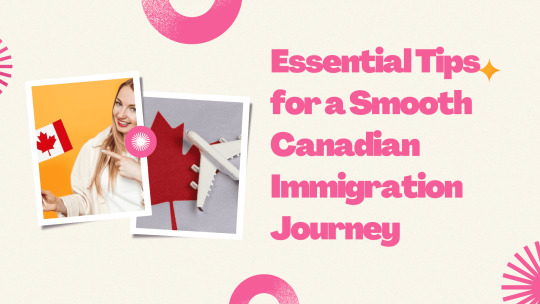
Canada has long been a beacon for immigrants from around the world, offering a high quality of life, a diverse culture, and ample opportunities for personal and professional growth. However, navigating the Canadian immigration process can be complex and daunting. To help prospective immigrants, we've compiled essential tips for a smooth Canada immigration journey.
1. Understand Your Options: Canada offers various immigration pathways, including Express Entry, Provincial Nominee Programs (PNPs), Family Sponsorship, and more. Research each option thoroughly to determine which one aligns best with your qualifications, goals, and circumstances.
2. Gather Necessary Documents: Different immigration streams require specific documents such as passports, language test results (like IELTS or CELPIP), educational credentials, work experience certificates, police clearance certificates, and proof of funds. Organize and gather these documents well in advance to avoid delays.
3. Assess Your Eligibility: Before applying, assess your eligibility for your chosen immigration program. Factors such as age, education, work experience, language proficiency, and adaptability are often considered. Use official tools like the Comprehensive Ranking System (CRS) for Express Entry to gauge your eligibility.
4. Language Proficiency: English and French are Canada's official languages. Depending on your immigration pathway, you may need to demonstrate proficiency in one or both languages through standardized tests. Prepare for these tests diligently and aim for the required scores.
5. Financial Preparation: Many Canada immigration programs require proof of sufficient funds to support yourself and your family in Canada. Understand the financial requirements and ensure you have the necessary funds in your account for the specified duration.
6. Consult with Immigration Experts: Immigration laws and procedures can be intricate. Consider seeking guidance from certified immigration consultants or lawyers who can provide personalized advice, clarify doubts, and help with the application process.
7. Stay Updated with Changes: Immigration policies and procedures may change over time. Stay informed about the latest updates from official government sources such as Immigration, Refugees and Citizenship Canada (IRCC) to avoid any surprises or misunderstandings.
8. Prepare for Medical Examinations: Some immigration streams require applicants to undergo medical examinations to ensure they meet health standards. Schedule these exams with approved medical practitioners as per the immigration guidelines.
9. Be Honest and Accurate: Accuracy and honesty are crucial throughout the immigration process. Provide truthful information in your applications, interviews, and interactions with immigration authorities. Any discrepancies can lead to delays or even denials.
10. Plan for Settlement: Once your immigration application is approved, start planning for your settlement in Canada. Research your destination city, housing options, healthcare facilities, education opportunities for children, job prospects, and community resources.
11. Network and Connect: Building a network of contacts in Canada can be beneficial. Join online forums, social media groups, and professional networks related to your field of expertise or interests. Networking can provide valuable insights, job leads, and social support upon arrival.
12. Stay Patient and Persistent: The immigration process may take time, and there can be unexpected challenges along the way. Stay patient, remain positive, and be persistent in pursuing your Canadian dream. Seek support from family, friends, and immigration professionals when needed.
By following these essential tips and staying organized, proactive, and well-informed, you can increase your chances of a smooth and successful Canada immigration journey. Canada welcomes diversity and talents from all corners of the world, making it an attractive destination for individuals seeking a better future.
0 notes
Text
2024 Canada Immigration: Everything You Need to Know
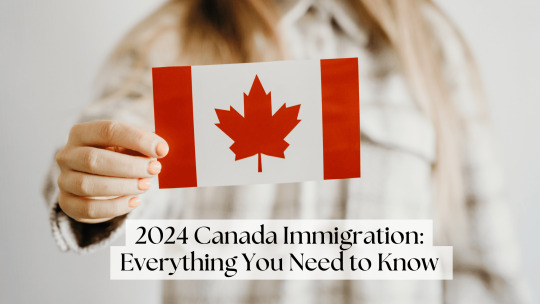
Canada has long been a favored destination for immigrants seeking a better quality of life, economic opportunities, and a welcoming multicultural environment. As the year 2024 unfolds, prospective immigrants are keen to understand the latest updates, policies, and procedures related to immigration to Canada. In this blog post, we'll explore everything you need to know about Canada immigration landscape in 2024.
1. Immigration Pathways:
Canada offers various immigration pathways to suit the diverse needs and backgrounds of applicants. These pathways include:
- Express Entry: This system manages applications for skilled workers under three main programs - the Federal Skilled Worker Program, Federal Skilled Trades Program, and Canadian Experience Class. Express Entry remains a popular choice for skilled individuals looking to settle in Canada permanently.
- Provincial Nominee Programs (PNPs): Each province and territory in Canada has its own PNP, allowing them to nominate candidates who meet their specific labor market and economic needs. PNPs are an excellent option for those with skills and experience targeted by a particular province or territory.
- Family Sponsorship: Canadian citizens and permanent residents can sponsor their family members, including spouses, common-law partners, parents, and dependent children, to immigrate to Canada.
- Business Immigration: Entrepreneurs, investors, and self-employed individuals can explore various programs such as the Start-up Visa Program, Provincial Entrepreneur Programs, and the Self-Employed Persons Program.
2. Express Entry System Updates:
In 2024, the Express Entry system continues to evolve with tweaks aimed at improving its efficiency and effectiveness. Updates may include changes to the Comprehensive Ranking System (CRS) points allocation, updates to the list of eligible occupations, and adjustments in the frequency of draws.
3. Immigration Levels Plan:
Canada regularly updates its Immigration Levels Plan, outlining the number of immigrants it plans to welcome each year. The plan takes into account economic, family reunification, and humanitarian immigration streams. Prospective immigrants should stay updated on the latest Canada Immigration Levels Plan to understand the opportunities available.
4. COVID-19 Impacts and Travel Restrictions:
The COVID-19 pandemic has significantly influenced immigration processes, including travel restrictions, quarantine requirements, and processing delays. As the situation evolves, applicants should stay informed about any changes in immigration policies related to the pandemic.
5. Immigration Policies and Regulations:
Canada's immigration policies and regulations undergo periodic reviews and updates. These changes may affect eligibility criteria, application procedures, and processing times. Prospective immigrants must familiarize themselves with the latest policies and regulations to ensure a smooth application process.
6. Immigration Consultants and Resources:
Navigating Canada's immigration system can be complex, and many applicants seek the assistance of immigration consultants or lawyers. It's crucial to choose reputable professionals who can provide accurate information and guidance throughout the immigration journey. Additionally, applicants can access resources such as official government websites, forums, and community organizations for valuable insights and support.
Conclusion:
In conclusion, Canada remains a top destination for immigrants seeking opportunities and a high quality of life. As you consider Canada immigration in 2024, staying informed about immigration pathways, policy updates, COVID-19 impacts, and available resources is essential. With careful planning and the right information, you can navigate the immigration process successfully and begin a new chapter in the vibrant and inclusive Canadian society.
0 notes
Text
The Untold Truth About Immigrating to Canada

Canada has long held a reputation as a land of opportunity, a country known for its welcoming nature, stunning landscapes, and diverse communities. For many around the world, immigrating to Canada represents a chance at a better life, a new beginning filled with promise and potential. However, behind the picturesque postcards and welcoming slogans lie some untold truths about the Canada immigration experience.
1. Immigration Process Complexity: One of the first challenges immigrants face is navigating the intricate immigration process. From understanding the various visa categories to gathering extensive documentation, the process can be overwhelming and time-consuming. For many, seeking professional assistance becomes a necessity, adding to the financial burden of immigrating.
2. Financial Considerations: While Canada offers numerous opportunities, it's crucial to recognize that starting a new life in a new country often comes with significant financial implications. From the costs associated with visa applications to the expenses of relocation and establishing oneself in a new environment, immigrants must be prepared for the financial challenges that lie ahead.
3. Job Market Realities: While Canada boasts a strong economy and diverse job market, finding employment as a newcomer can be challenging. Many immigrants face barriers such as unfamiliarity with Canadian work culture, credential recognition issues, and language proficiency requirements. This can lead to periods of unemployment or underemployment, impacting financial stability and mental well-being.
4. Cultural Adjustment: Adapting to a new culture and way of life is a journey filled with both enriching experiences and daunting challenges. Immigrants may encounter cultural differences in everyday interactions, social norms, and workplace dynamics. Building a support network and actively engaging in cultural integration activities are essential steps in overcoming these challenges.
5. Housing and Cost of Living: While Canada offers a high standard of living, the cost of housing, especially in major cities like Toronto and Vancouver, can be prohibitively high for Canada immigration. Securing affordable and suitable housing, particularly for larger families, can pose a significant challenge for newcomers. Additionally, the overall cost of living, including healthcare, education, and daily expenses, must be factored into financial planning for Canada immigration.
6. Weather and Geographic Considerations: Canada's vast geographic diversity means that weather and environmental conditions vary widely across the country. Immigrants coming from warmer climates may find it challenging to adjust to Canada's cold winters and seasonal changes. Access to essential services, transportation infrastructure, and proximity to employment opportunities can also vary depending on the chosen location of the settlement.
7. Social Integration and Community Support: Building a sense of belonging and community is crucial for immigrant well-being and integration. While Canada prides itself on multiculturalism and diversity, newcomers may still face social isolation and challenges in forging meaningful connections. Accessing community resources, language classes, and cultural events can facilitate social integration and support networks.
8. Legal Rights and Responsibilities: Understanding one's legal rights and responsibilities as an immigrant in Canada is vital. This includes knowledge of immigration laws, healthcare coverage, taxation, and access to social services. Immigrants must also stay informed about changes in immigration policies and regulations that may impact their status or eligibility for benefits.
Despite these challenges, it's important to note that many immigrants thrive and succeed in Canada, contributing to the country's rich tapestry of cultures and perspectives. With perseverance, resilience, and support, newcomers can overcome the hurdles of Canada immigration and build fulfilling lives in their new homes.
In conclusion, immigrating to Canada offers immense opportunities for personal and professional growth, but it also comes with its share of challenges and realities. Acknowledging and preparing for these challenges can better equip immigrants to navigate the journey successfully. As a nation built by immigrants, Canada continues to welcome individuals from around the world, enriching its society and shaping its future.
0 notes
Text
Canadian Immigration for Indians: Eligibility, Programs & Tips

Canada has emerged as one of the top destinations for Indian immigrants seeking better opportunities, quality of life, and a welcoming environment. With its robust economy, diverse culture, and progressive immigration policies, Canada continues to attract skilled professionals, students, and families from around the world, including India. In this blog, we'll explore the eligibility criteria, various immigration programs, and some tips for Indian individuals considering a move to Canada.
Eligibility for Canadian Immigration
Age, Education, and Work Experience
To be eligible for Canada immigration, applicants often need to meet certain criteria related to age, education, and work experience. Many immigration programs prioritize younger individuals with higher education and relevant work experience in occupations that are in demand in Canada.
Language Proficiency
Proficiency in English or French is crucial for most immigration pathways. Applicants are usually required to take language proficiency tests such as IELTS (International English Language Testing System) or CELPIP (Canadian English Language Proficiency Index Program) for English and TEF (Test d'Évaluation de Français) for French.
Health and Character Requirements
Immigrants must undergo medical examinations and provide police certificates to prove good health and character. Certain health conditions or criminal records may affect eligibility for immigration.
Canadian Immigration Programs for Indians
Express Entry System
The Express Entry system is a popular pathway for skilled workers to immigrate to Canada. It manages applications for three federal economic immigration programs: the Federal Skilled Worker Program (FSWP), the Federal Skilled Trades Program (FSTP), and the Canadian Experience Class (CEC). Candidates create an online profile and are ranked based on factors like age, education, work experience, and language proficiency.
Provincial Nominee Programs (PNPs)
PNPs allow Canadian provinces and territories to nominate individuals for immigration based on their specific labor market and economic needs. Many provinces have streams tailored for skilled workers, entrepreneurs, and students. Indian immigrants can explore PNPs like the Ontario Immigrant Nominee Program (OINP), British Columbia Provincial Nominee Program (BC PNP), and Alberta Immigrant Nominee Program (AINP), among others.
Family Sponsorship
Canadian citizens and permanent residents can sponsor their family members for immigration to Canada. This includes spouses, partners, dependent children, parents, and grandparents. Family sponsorship provides a pathway for Indian families to reunite and settle in Canada.
Study Permits
Indian students can pursue higher education in Canada by obtaining study permits. Canada's universities and colleges offer a wide range of programs and opportunities for international students. Upon graduation, students may be eligible for post-graduation work permits and pathways to permanent residency.
Tips for Indian Immigrants
Research Immigration Programs
Take the time to research and understand the various immigration programs available. Each program has its own requirements, eligibility criteria, and application processes. Choose the program that best suits your qualifications, skills, and goals.
Improve Language Skills
Language proficiency is a key factor in Canada immigration. Invest time in improving your English or French language skills by taking language courses and practicing regularly. Higher language scores can enhance your Express Entry profile and overall chances of success.
Obtain Educational Credential Assessments (ECAs)
For Express Entry and some provincial programs, applicants must obtain Educational Credential Assessments (ECAs) to evaluate their foreign educational credentials against Canadian standards. Ensure you have the necessary ECAs for your qualifications.
Build Canadian Experience
Gaining Canadian work experience through programs like the Canadian Experience Class (CEC) or post-graduation work permits can strengthen your profile and increase your points under Express Entry. Consider internships, co-op programs, or volunteer work to gain valuable experience.
Seek Professional Advice
Navigating the Canadian immigration process can be complex. Consider seeking guidance from licensed immigration consultants or lawyers who can provide personalized advice and assistance with applications, and help you understand your options.
In conclusion, Canada immigration offers promising opportunities for Indians seeking to build a better future in a diverse and inclusive society. By meeting eligibility criteria, exploring relevant immigration programs, and following these tips, Indian immigrants can embark on a successful journey to Canada. Remember to plan, stay informed, and make informed decisions to make your Canadian dream a reality.
0 notes
Text
Canada Immigration Quiz: Is It Right for You?

Canada, with its welcoming environment, diverse culture, and promising opportunities, often stands out as a top choice for immigrants worldwide. However, deciding to move to a new country is a significant step that requires careful consideration. To help you assess whether Canada is the right fit for you, we've created the ultimate Canada Immigration Quiz.
1. Do you value diversity and inclusivity?
Canada is celebrated for its multiculturalism and welcoming attitude towards immigrants from all backgrounds. If you appreciate living in a diverse society where people of various cultures coexist harmoniously, Canada could be a perfect fit for you.
2. Are you seeking economic opportunities?
Canada offers a strong economy with diverse industries such as technology, healthcare, finance, and natural resources. If you're seeking job opportunities, career growth, and a stable economy, Canada's thriving job market might align with your goals.
3. Do you prioritize access to healthcare and social services?
Canada's universal healthcare system ensures that residents have access to essential medical services without financial barriers. Additionally, social services like education, childcare, and retirement benefits contribute to a high standard of living for Canadian residents.
4. Are you drawn to Canada's natural beauty and outdoor activities?
Canada boasts breathtaking natural landscapes, including mountains, forests, lakes, and coastal areas. If you enjoy outdoor activities like hiking, skiing, camping, or simply appreciating nature's beauty, Canada's abundant outdoor opportunities could enhance your lifestyle.
5. Do you value safety and security?
Canada consistently ranks high in global safety and security indexes, offering a peaceful environment for residents. If safety is a top priority for you and your family, Canada's low crime rates and stable political landscape can provide peace of mind.
6. Are you open to adapting to Canada's climate?
Canada experiences diverse climates ranging from mild on the west coast to cold winters in the northern regions. If you're open to experiencing different seasons and adapting to varying weather conditions, Canada's climate diversity might appeal to you.
7. Do you prioritize work-life balance and quality of life?
Canada emphasizes work-life balance, with policies that promote flexible work arrangements, parental leave, and leisure time. If you prioritize a fulfilling personal life alongside your career, Canada's focus on quality of life could align with your values.
8. Are you interested in Canada's arts and cultural scene?
Canada has a vibrant arts and cultural scene, with museums, galleries, theaters, festivals, and diverse culinary experiences. If you enjoy immersing yourself in different cultures, exploring artistic expressions, and trying new cuisines, Canada offers a rich cultural tapestry to explore.
9. Are you ready for the immigration process and potential challenges?
Moving to a new country involves navigating immigration procedures, adapting to a new environment, and facing potential challenges such as cultural adjustments and establishing a social network. If you're ready to embrace these aspects and view them as opportunities for personal growth, Canada could be a rewarding choice.
10. Do you see Canada as a place to build a future for yourself and your family?
Canada offers opportunities for individuals and families to thrive, with access to education, healthcare, employment, and a supportive community. If you envision Canada as a place to build a fulfilling future and create lasting memories, it could be the ideal destination for you.
Reflecting on these questions can help you gauge whether Canada aligns with your values, aspirations, and lifestyle preferences. Keep in mind that each person's journey is unique, and consulting with Canada immigration experts can provide valuable guidance tailored to your specific situation. Whether you're seeking new adventures, career opportunities, a safe environment, or a better quality of life, Canada may just be the right destination for you to thrive and create lasting memories.
0 notes
Text
Canada's Immigration Choices: Insights from Express Entry Draws

Canada, renowned for its welcoming stance towards immigrants, continues to showcase its commitment to diversity and inclusion through the Express Entry system. This system serves as a pathway for skilled workers to immigrate to Canada based on their qualifications, work experience, and other factors. The regular Express Entry draws offer a fascinating insight into Canada immigration choices, reflecting its evolving needs and priorities.
The Express Entry System: A Brief Overview
The Express Entry system is Canada's flagship program for managing applications for permanent residence from skilled workers. It comprises three main economic immigration streams:
1. Federal Skilled Worker Program (FSWP): Targets individuals with the skills and experience needed to contribute to Canada's economy.
2. Federal Skilled Trades Program (FSTP): For skilled tradespeople with work experience in specific occupations.
3. Canadian Experience Class (CEC): Designed for individuals who have gained skilled work experience in Canada.
Applicants interested in any of these programs create an Express Entry profile, where they are assessed based on factors like age, education, work experience, language proficiency, and adaptability.
Express Entry Draws: The Selection Process
Express Entry draws occur at regular intervals, typically every two weeks, although the frequency can vary based on immigration needs. During each draw, Immigration, Refugees and Citizenship Canada (IRCC) issues Invitations to Apply (ITAs) to candidates who meet or exceed the minimum Comprehensive Ranking System (CRS) score set for that particular draw.
The CRS score is determined by factors such as:
- Core human capital factors (age, education, language proficiency, work experience)
- Skills transferability factors (combination of factors that enhance a candidate's adaptability)
- Additional points (for factors like provincial nomination, Canadian study experience, etc.)
Candidates with the highest CRS scores receive ITAs, allowing them to apply for permanent residence within a specified timeframe.
Insights from Recent Express Entry Draws
Analyzing recent Express Entry draws provides valuable insights into Canada immigration strategy:
1. Occupational Demand: The CRS score cutoff often reflects Canada's demand for specific occupations. Higher scores may indicate a need for healthcare, IT, engineering, or trades professionals.
2. Provincial Nomination Programs (PNPs): Many draws prioritize candidates with provincial nominations, highlighting the importance of PNPs in addressing regional labor market needs.
3. Language Proficiency: Strong language skills, especially in English and French, continue to be a significant factor in CRS score allocation.
4. Education and Experience: Candidates with higher levels of education and relevant work experience tend to score higher, aligning with Canada's focus on skilled and experienced immigrants.
Canada's Immigration Vision
Through the Express Entry system and related programs, Canada demonstrates a strategic approach to immigration, aiming to:
- Address labor market gaps by attracting skilled workers in key sectors.
- Promote diversity and inclusion by welcoming individuals from various backgrounds.
- Support economic growth and innovation through a talented and diverse workforce.
- Encourage settlement and integration by providing pathways to permanent residence.
Canada's immigration policies prioritize candidates who can contribute to the country's economy and society, fostering a dynamic and thriving nation.
Conclusion
The Express Entry offers a window into Canada immigration priorities, showcasing its efforts to attract skilled individuals who can contribute to its economy and cultural mosaic. By leveraging the Express Entry system, Canada continues to shape its immigration landscape in alignment with evolving societal and economic needs, reaffirming its status as a global leader in welcoming skilled talent from around the world.
0 notes
Text
Cracking the Code: Understanding Canada's Immigration Programs

Canada has long been recognized as a land of opportunity, attracting people from all corners of the globe with its high standard of living, excellent healthcare system, diverse culture, and strong economy. For those looking to make Canada their new home, understanding the various Canada immigration programs can seem like cracking a complex code. In this blog, we'll explore the key immigration programs in Canada and shed light on how aspiring immigrants can navigate this process effectively.
1. Express Entry System
The Express Entry System is one of the most popular pathways for skilled workers to immigrate to Canada. It is a points-based system that assesses candidates based on factors such as age, education, work experience, language proficiency, and adaptability. The Comprehensive Ranking System (CRS) assigns points to candidates, and those with the highest scores are invited to apply for permanent residence through regular draws conducted by Immigration, Refugees and Citizenship Canada (IRCC).
Key programs under Express Entry include the Federal Skilled Worker Program (FSWP), the Federal Skilled Trades Program (FSTP), and the Canadian Experience Class (CEC). Each program has its eligibility criteria, and candidates must meet the requirements of at least one of these programs to enter the Express Entry pool.
2. Provincial Nominee Programs (PNPs)
Provincial Nominee Programs are designed to address specific labor market needs in different provinces and territories across Canada. Each province or territory has its PNP with unique streams targeting skilled workers, entrepreneurs, students, and other categories of immigrants. Candidates interested in PNPs can apply directly to the province or territory they wish to settle in, and if nominated, they receive additional points in the Express Entry CRS, enhancing their chances of receiving an Invitation to Apply (ITA) for permanent residence.
PNPs offer a pathway for individuals with skills and experience that align with the economic priorities of a particular province, making them valuable contributors to the local economy and community.
3. Family Sponsorship
Canada values family reunification and offers a Family Class Sponsorship program for Canadian citizens and permanent residents to sponsor their family members for immigration. This includes sponsoring spouses, partners, dependent children, parents, and grandparents. Sponsors must meet certain eligibility requirements, including demonstrating the ability to support their sponsored family members financially.
Family reunification plays a significant role in Canada immigration policies, promoting social cohesion and strengthening family ties across borders.
4. Business Immigration Programs
Canada also welcomes entrepreneurs, investors, and self-employed individuals through various business immigration programs. These programs aim to attract individuals with the skills, experience, and resources to contribute to Canada's economy and create jobs.
Key business immigration programs include the Start-up Visa Program, which targets innovative entrepreneurs with viable business ideas; the Provincial Entrepreneur Programs, offered by several provinces for entrepreneurs interested in establishing or investing in a business in that province; and the Immigrant Investor Program, which is currently under review but historically attracted high-net-worth individuals willing to invest in Canadian businesses or government bonds.
5. Refugee and Humanitarian Programs
Canada is committed to protecting refugees and individuals in need of humanitarian assistance. The country's refugee and asylum system is designed to offer refuge to those fleeing persecution, war, or other forms of danger in their home countries. The Refugee and Humanitarian Resettlement Program, managed by IRCC, provides support to refugees and facilitates their integration into Canadian society.
Additionally, Canada participates in international initiatives such as the Private Sponsorship of Refugees Program, which allows private groups and organizations to sponsor refugees and help them resettle in Canada.
Navigating the Immigration Process
Understanding Canada's immigration programs requires careful consideration of eligibility criteria, application processes, and documentation requirements. Prospective immigrants must conduct thorough research, seek professional advice if needed, and stay updated on any changes or updates to immigration policies and procedures.
The key to successfully navigating Canada immigration process lies in preparation, patience, and perseverance. By aligning their skills, qualifications, and aspirations with the appropriate immigration program, individuals can increase their chances of achieving their goal of immigrating to Canada and building a brighter future for themselves and their families.
In conclusion, Canada's immigration programs offer diverse pathways for individuals with varying backgrounds and aspirations to make Canada their new home. Whether through skilled worker programs, family sponsorship, business immigration, or refugee resettlement, Canada welcomes immigrants who can contribute to its economy, society, and cultural fabric. By understanding the nuances of these programs and meeting the relevant criteria, aspiring immigrants can unlock the opportunities that Canada has to offer and embark on a new chapter of their lives in this vibrant and inclusive country.
0 notes
Text
Canada's Immigration Secrets: A Guide to Successful Settlement

Canada's immigration policies have long been admired for their inclusivity and support for newcomers from all walks of life. Whether you're a skilled worker, a student, an entrepreneur, or a refugee, Canada offers pathways to a better life and opportunities for success. In this blog, we'll delve into some of the secrets behind the successful Canada immigration system and explore how newcomers can make the most of their settlement journey.
1. Diverse Immigration Pathways: One of Canada's biggest secrets to successful immigration is its diverse range of pathways for newcomers. From the Express Entry system for skilled workers to provincial nominee programs, family sponsorship, and refugee resettlement programs, Canada provides multiple avenues for people to immigrate based on their qualifications, experiences, and circumstances.
2. Welcoming Communities: Another key aspect of Canada immigration success is its welcoming and inclusive communities. Across the country, newcomers find support networks, cultural diversity, and opportunities to integrate into society. Cities like Toronto, Vancouver, and Montreal are known for their multiculturalism, making them popular destinations for immigrants seeking a vibrant and diverse environment.
3. Strong Economy and Job Opportunities: Canada's strong economy and job opportunities are magnets for skilled workers and professionals from around the world. With sectors like technology, healthcare, engineering, and finance experiencing growth, immigrants find ample employment prospects and career advancement opportunities in Canada.
4. Quality Education and Healthcare: Canada's commitment to providing quality education and healthcare is another secret to its immigration success. Immigrant families benefit from access to top-notch schools, universities, and healthcare services, ensuring a high quality of life for themselves and their children.
5. Integration and Support Services: Canada invests in integration and support services to help newcomers settle and thrive in their new homes. Settlement agencies, language training programs, employment support services, and cultural orientation programs are available to assist immigrants in navigating their transition to life in Canada.
6. Safety and Security: Canada's reputation as a safe and peaceful country is a major draw for immigrants seeking a secure environment to raise their families and pursue their dreams. Low crime rates, political stability, and respect for human rights contribute to Canada's appeal as a desirable immigration destination.
7. Commitment to Diversity and Inclusion: Canada's commitment to diversity and inclusion is at the heart of its immigration success. Embracing people from different backgrounds, cultures, and religions enriches Canadian society and contributes to its prosperity and resilience.
In conclusion, Canada immigration secrets lie in its diverse pathways, welcoming communities, strong economy, quality services, and commitment to diversity and inclusion. By understanding and leveraging these factors, newcomers can embark on a successful settlement journey and build a bright future in the Great White North.
0 notes
Text
Canadian Immigration Myths Debunked
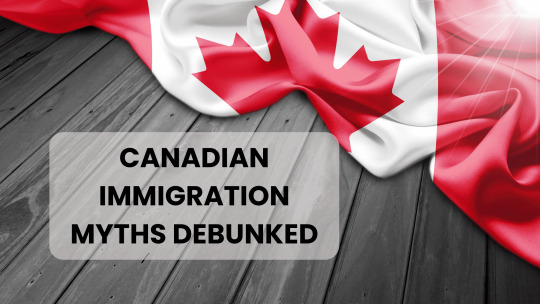
Canada, known for its diversity, inclusivity, and strong economy, has long been a preferred destination for immigrants seeking better opportunities and quality of life. However, amidst the allure of moving to Canada, several myths and misconceptions about the immigration process have emerged. In this blog, we'll debunk some of the most common Canada immigration myths to provide a clearer understanding for those considering making Canada their new home.
Myth 1: Immigration to Canada is Easy
One of the most pervasive myths is that immigrating to Canada is a simple process. While Canada does have various immigration programs designed to attract skilled workers, students, entrepreneurs, and family members, the process itself can be complex and demanding. Applicants often need to meet specific criteria related to education, work experience, language proficiency, and other factors. Additionally, the competition for immigration spots can be intense, especially for popular programs like the Express Entry system.
Myth 2: It's Expensive to Immigrate to Canada
Another common misconception is that immigrating to Canada is financially burdensome. While there are costs involved in the Canada immigration process, such as application fees, language tests, and credential assessments, these expenses are generally reasonable compared to the benefits of living in Canada. Moreover, many provinces and territories offer immigration programs that can reduce financial barriers for skilled workers, entrepreneurs, and investors.
Myth 3: Immigrants Take Jobs Away from Canadians
This myth stems from the belief that immigrants compete with native Canadians for jobs and opportunities. However, numerous studies have shown that immigration contributes to economic growth by filling labor shortages, starting businesses, and paying taxes. Immigrants often take on jobs that are difficult to fill locally, leading to increased productivity and innovation in various industries. Additionally, immigrants bring diverse skills and perspectives that can benefit Canadian businesses and communities.
Myth 4: Canada Only Accepts Highly Skilled Immigrants
While Canada does prioritize skilled workers through programs like the Federal Skilled Worker Program and the Provincial Nominee Program, it also welcomes immigrants with a range of qualifications and backgrounds. There are pathways for international students, caregivers, refugees, and family members to immigrate to Canada based on different criteria. The country values diversity and recognizes the contributions that immigrants make to its social and cultural fabric.
Myth 5: Immigrants Struggle to Adapt and Integrate
Adapting to a new country and culture can be challenging, but Canada offers numerous resources and support services to help immigrants settle and integrate successfully. From language classes and employment assistance to community programs and cultural events, newcomers have access to a wide range of support networks. Canadian society is generally welcoming and inclusive, embracing diversity as a fundamental strength.
Myth 6: Immigrants Drain Social Services and Welfare
Contrary to this myth, immigrants in Canada contribute significantly to the economy and social systems. Many immigrants arrive with valuable skills and education, leading to higher employment rates and tax contributions. Moreover, immigrants often start businesses, create jobs, and stimulate economic growth in their communities. While newcomers may access certain social services initially, they quickly become self-sufficient and contribute positively to Canadian society.
In conclusion, Canada immigration myths often misrepresent the realities of the immigration process and the contributions of immigrants to the country. By debunking these myths, we can foster a more informed and inclusive conversation about immigration and recognize the valuable role that newcomers play in shaping Canada's future. If you're considering immigrating to Canada, it's essential to seek accurate information from official sources and consult with immigration professionals to navigate the process successfully. Canada remains a welcoming and diverse nation that embraces individuals from all walks of life, enriching its social, cultural, and economic landscape in the process.
0 notes
Text
The Secret Weapon for a Smooth Canadian Immigration

Canada has long been a beacon of opportunity and diversity, attracting immigrants from around the world with its high standard of living, excellent healthcare system, and welcoming communities. However, navigating the complexities of Canada immigration can be daunting without the right tools and guidance. In this blog, we'll explore the secret weapon for a smooth Canadian immigration process: hiring an immigration consultant.
Why Immigrate to Canada?
Before delving into the role of an immigration consultant, let's first understand why Canada is such a desirable destination for immigrants.
1. Quality of Life: Canada consistently ranks high in quality of life indexes due to factors like excellent healthcare, safety, education, and opportunities for personal and professional growth.
2. Diverse and Inclusive Society: Canada prides itself on being a multicultural nation that celebrates diversity and promotes inclusivity, making it a welcoming place for people from all backgrounds.
3. Strong Economy: With a robust economy driven by various sectors such as technology, finance, healthcare, and natural resources, Canada offers ample job opportunities and a stable environment for businesses.
4. Social Services: Canadians benefit from various social services, including universal healthcare, social security, education subsidies, and more, ensuring a high standard of living for residents.
Challenges in the Immigration Process
Despite its many advantages, the Canada immigration process can pose challenges for newcomers. Some of the hurdles individuals may encounter include:
1. Complexity of Immigration Programs: Canada offers various immigration pathways, each with its own eligibility criteria, documentation requirements, and processing times, making it difficult for applicants to navigate without professional assistance.
2. Language and Cultural Differences: Non-native English or French speakers may struggle with language proficiency tests like IELTS or CELPIP while adjusting to Canadian cultural norms and expectations can also be a learning curve.
3. Legal and Procedural Knowledge: Understanding Canadian immigration laws, policies, and procedures requires specialized knowledge that may not be readily accessible to newcomers.
4. Documentation and Application Errors: Even minor mistakes or omissions in immigration applications can lead to delays or rejections, highlighting the importance of accuracy and thoroughness in paperwork.
The Role of an Immigration Consultant
Here's where an immigration consultant becomes invaluable. Immigration consultants are professionals trained and licensed to provide expert guidance and support throughout the immigration process. Here are some ways they can help:
1. Assessment and Eligibility: Consultants assess individuals' eligibility for various immigration programs based on education, work experience, language proficiency, and familial ties, recommending the most suitable pathway.
2. Documentation and Application Preparation: Consultants assist with gathering and organizing required documents, filling out forms accurately, and ensuring all submissions meet the immigration authorities' standards.
3. Language Proficiency Support: Consultants offer guidance and resources for language proficiency tests, helping applicants improve their English or French skills and achieve the required scores.
4. Legal Compliance: Consultants ensure applicants comply with Canadian immigration laws and regulations, preventing costly mistakes or oversights that could jeopardize their immigration status.
5. Representation and Advocacy: Consultants act as advocates for applicants, representing their interests and communicating with immigration authorities on their behalf, resolving issues and addressing concerns effectively.
6. Post-Arrival Services: Some consultants offer post-arrival services such as settlement assistance, job search support, and orientation programs to help newcomers integrate smoothly into Canadian society.
Choosing the Right Immigration Consultant
While hiring an immigration consultant can greatly facilitate the immigration process, choosing the right professional is essential. Here are some tips for selecting a reputable consultant:
1. Check Credentials: Ensure the consultant is licensed and registered with the Immigration Consultants of Canada Regulatory Council (ICCRC) or a recognized provincial regulatory body.
2. Experience and Expertise: Look for consultants with extensive experience in Canadian immigration, preferably specializing in the specific immigration stream you're interested in.
3. Client Reviews and Testimonials: Read reviews and testimonials from past clients to gauge the consultant's reputation, success rate, and client satisfaction.
4. Transparent Fees: Choose a consultant who provides clear information about their fees, services included, and any additional costs upfront, avoiding hidden charges or ambiguous pricing.
5. Communication and Accessibility: Opt for a consultant who communicates effectively, responds promptly to inquiries, and maintains open lines of communication throughout the process.
Conclusion
In conclusion, while Canada immigration offers tremendous opportunities, navigating the process successfully requires expert guidance and support. Hiring an immigration consultant can be the secret weapon that ensures a smooth and efficient immigration journey, from initial assessment to settlement in Canada. By leveraging their knowledge, experience, and advocacy, applicants can enhance their chances of a successful immigration outcome and start their new chapter in Canada with confidence and peace of mind.
0 notes
Text
Why Immigrate to Canada in 2024?

Canada has long been known as a land of opportunity, diversity, and natural beauty. As we step into 2024, the allure of immigrating to Canada has only grown stronger for individuals and families seeking a better quality of life, enhanced career prospects, and a welcoming environment. Canada immigration policies continue to attract people from around the globe, drawn by its reputation for inclusivity and economic stability. In this blog, we delve into the myriad reasons why immigrating to Canada in 2024 is a compelling choice.
1. Robust Economy: Canada boasts a stable and robust economy, characterized by strong growth across various sectors. Industries such as technology, healthcare, finance, and renewable energy continue to thrive, offering ample employment opportunities for skilled professionals. The country's sound economic policies, coupled with a focus on innovation and sustainability, make it an attractive destination for those looking to build successful careers.
2. Quality of Life: Canada consistently ranks high in global quality of life indexes, thanks to its excellent healthcare system, high education standards, safety, and clean environment. Cities like Vancouver, Toronto, and Montreal are renowned for their cultural vibrancy, diverse communities, and abundant recreational opportunities, ensuring a high standard of living for residents.
3. Immigration-Friendly Policies: Canada has a reputation for being one of the most immigrant-friendly countries in the world. Its immigration policies prioritize family reunification, skilled workers, entrepreneurs, and international students. Programs such as the Express Entry system, Provincial Nominee Program (PNP), and Start-Up Visa Program make it easier for qualified individuals to obtain permanent residency and eventually citizenship.
4. Multicultural Society: Canada embraces multiculturalism and celebrates diversity, creating a welcoming atmosphere for immigrants from all backgrounds. The country's commitment to inclusivity, tolerance, and respect for human rights fosters a sense of belonging among newcomers, making integration into Canadian society smoother and more fulfilling.
5. Education Opportunities: Canada is home to world-class universities and colleges renowned for their quality education, cutting-edge research facilities, and global recognition. International students flock to Canada to pursue degrees in various fields, benefiting from a multicultural learning environment and post-graduation work opportunities through programs like the Post-Graduation Work Permit (PGWP). Moreover, Canada immigration policies actively encourage international students to transition smoothly from studying to working and potentially becoming permanent residents, further enhancing its appeal as a destination for education and career advancement.
6. Natural Beauty and Outdoor Lifestyle: From stunning national parks and picturesque landscapes to pristine lakes and snow-capped mountains, Canada offers unparalleled natural beauty. Outdoor enthusiasts can indulge in a myriad of activities such as skiing, hiking, camping, and wildlife exploration, making it an ideal destination for nature lovers and adventure seekers.
7. Progressive Values: Canada prides itself on upholding progressive values such as equality, LGBTQ+ rights, environmental sustainability, and social justice. The country's commitment to inclusivity and fairness resonates with many individuals and families seeking a progressive and forward-thinking society to call home.
8. Strong Healthcare System: Access to quality healthcare is a fundamental right in Canada, with its publicly funded healthcare system providing essential medical services to residents. This ensures peace of mind for immigrants and their families, knowing that they can access healthcare services when needed without facing financial barriers.
9. Business and Entrepreneurship: Canada offers a conducive environment for entrepreneurs and startups, with various support programs, incubators, and venture capital opportunities available. The Start-Up Visa Program, for instance, attracts innovative entrepreneurs with promising business ideas, contributing to the country's economic growth and innovation ecosystem.
10. Global Citizenship: By immigrating to Canada, individuals and families can become global citizens with access to a Canadian passport, which ranks among the most powerful passports globally. This opens doors to visa-free travel to numerous countries and enhances mobility and opportunities on a global scale.
In conclusion, immigrating to Canada in 2024 presents a plethora of opportunities and advantages across economic, social, cultural, and personal domains. Whether you're seeking career growth, a higher quality of life, educational pursuits, or a welcoming community, Canada immigration stands out as a beacon of opportunity and inclusivity on the world stage.
0 notes
Text
5 Mistakes to Avoid When Immigrating to Canada

Canada is a land of opportunities, known for its welcoming attitude towards immigrants from all over the world. However, navigating the Canada immigration process can be complex, and making mistakes along the way can delay or even jeopardize your plans. To help you on your journey to becoming a Canadian resident, here are five common mistakes to avoid when immigrating to Canada.
1. Incomplete or Incorrect Documentation
One of the most crucial aspects of the immigration process is ensuring that you have all the required documents and that they are filled out accurately. This includes application forms, proof of identity, educational credentials, employment history, financial documents, and any other relevant paperwork. Even a small error or missing document can lead to delays or rejections.
To avoid this mistake, thoroughly read and understand the requirements outlined by Immigration, Refugees and Citizenship Canada (IRCC). Double-check all forms and documents before submitting them, and consider seeking assistance from an immigration consultant or lawyer if needed.
2. Lack of Understanding of Immigration Programs
Canada offers various immigration programs, each with its own eligibility criteria, application process, and requirements. Common pathways include Express Entry for skilled workers, Provincial Nominee Programs (PNPs) for specific provinces, family sponsorship, and study or work permits. Choosing the right program that aligns with your qualifications and goals is essential for a successful immigration journey.
Before applying, research and understand the different immigration programs available to you. Evaluate your skills, education, work experience, and other factors to determine which program suits you best. Consulting with an immigration professional can also provide valuable insights and guidance.
3. Insufficient Language Proficiency
Proficiency in English and/or French is often a requirement for immigration to Canada, especially for skilled worker programs like Express Entry. Adequate language skills are crucial for integrating into Canadian society, finding employment, and communicating effectively with others. Underestimating the importance of language proficiency can hinder your chances of success in the Canada immigration process.
To avoid this mistake, assess your language abilities early on and take language proficiency tests such as the International English Language Testing System (IELTS) or the Test d'évaluation de français (TEF). If your language skills are below the required level, consider enrolling in language courses or seeking additional practice to improve your proficiency.
4. Neglecting Financial Preparation
Financial stability is a significant factor considered by immigration authorities when evaluating applications. Applicants must demonstrate their ability to support themselves and their dependents financially upon arrival in Canada. This includes showing proof of sufficient funds for settlement, accommodation, transportation, and living expenses.
Before applying for immigration, assess your financial situation and ensure that you meet the minimum requirements set by IRCC. Keep detailed records of your financial assets, income, savings, and any additional sources of support. Plan to avoid any financial surprises or setbacks during the immigration process.
5. Failure to Seek Professional Guidance
Navigating the immigration process can be overwhelming, especially for first-time applicants or those unfamiliar with Canadian immigration policies and procedures. Relying solely on online resources or anecdotal advice from friends or family members may lead to misunderstandings or mistakes.
To enhance your chances of success and streamline the immigration process, consider seeking professional guidance from immigration consultants, lawyers, or registered representatives. These experts can provide personalized advice, review your application thoroughly, and address any concerns or questions you may have.
In conclusion, immigrating to Canada is a life-changing decision that requires careful planning, preparation, and attention to detail. By avoiding these common mistakes and seeking the right support, you can navigate the Canada immigration process more effectively and achieve your goal of starting a new chapter in Canada.
0 notes
Text
Top 3 Cities for Indian Immigrants in Canada Immigration
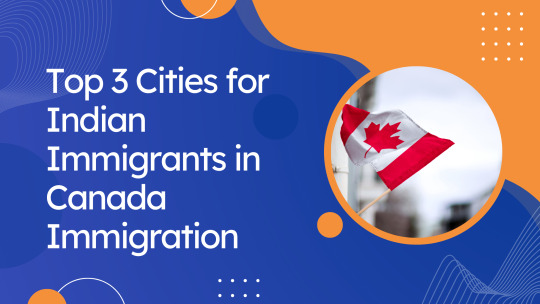
Canada has long been a favored destination for immigrants from around the world, including a significant number from India. With its strong economy, welcoming Canada immigration policies, and diverse communities, Canada offers a promising future for individuals and families seeking new opportunities. Among the various cities in Canada, some stand out as particularly attractive for Indian immigrants due to factors such as job opportunities, cultural amenities, and vibrant Indian communities. In this blog post, we'll explore the top three cities for Indian immigrants in Canada.
1. Toronto, Ontario
Toronto consistently ranks as one of the most multicultural cities in the world, making it an ideal destination for Indian immigrants seeking a diverse and inclusive environment. The Greater Toronto Area (GTA) is home to a large Indian population, with thriving Indian neighborhoods such as Brampton, Scarborough, and Mississauga. These areas offer a range of cultural activities, Indian grocery stores, restaurants serving authentic cuisine, and religious institutions.
From a career perspective, Toronto is Canada's financial and business hub, providing numerous job opportunities in sectors like finance, technology, healthcare, and education. The city boasts top universities and colleges, making it attractive for students pursuing higher education as well. Additionally, Toronto's public transportation system, cultural events, and recreational facilities contribute to its appeal as a livable and vibrant city for Indian immigrants.
2. Vancouver, British Columbia
Vancouver is renowned for its stunning natural beauty, mild climate, and diverse population, making it a popular choice for Indian immigrants seeking a high quality of life. The city's strong economy, particularly in industries such as technology, film and television production, and tourism, offers job prospects for skilled workers and professionals interested in Canada immigration. Moreover, Vancouver's proximity to Asia makes it an attractive location for businesses with international connections.
In terms of community, Vancouver has a growing Indian population, with neighborhoods like Surrey and Richmond known for their cultural diversity. Indian festivals, temples, and cultural associations add to the sense of belonging for Indian immigrants living in the city. The availability of outdoor recreational activities, multicultural events, and excellent healthcare and education systems further enhance Vancouver's appeal.
3. Calgary, Alberta
Calgary is a thriving city in Alberta known for its strong economy driven by the energy sector, as well as opportunities in technology, engineering, finance, and healthcare. Indian immigrants with backgrounds in these industries can find promising career prospects in Calgary. The city's lower cost of living compared to Toronto and Vancouver also makes it an attractive choice for newcomers looking to establish themselves in Canada.
Calgary's Indian community has been growing steadily, with cultural organizations, festivals, and businesses catering to the needs of Indian residents. The city's welcoming atmosphere, friendly neighborhoods, and proximity to natural attractions such as the Rocky Mountains make it an appealing place to live for Indian families. Additionally, Calgary's focus on work-life balance and community engagement adds to its overall appeal.
In conclusion, Toronto, Vancouver, and Calgary stand out as top destinations for Indian immigrants in Canada Immigration, offering diverse opportunities, vibrant communities, and a high quality of life. Whether seeking career advancement, educational opportunities, or a supportive cultural environment, these cities provide a welcoming and enriching experience for Indian newcomers looking to build a successful life in Canada.
0 notes
Text
Immigrating to Canada in 2024: A Comprehensive Guide

Are you considering making Canada your new home in 2024? With its breathtaking landscapes, thriving economy, and reputation for being a welcoming and diverse nation, it's no surprise that Canada continues to be a top destination for immigrants from all over the world. Whether you're drawn to the bustling cities of Toronto and Vancouver, the cultural richness of Montreal, or the pristine wilderness of the Canadian Rockies, this comprehensive guide will help you navigate the Canada immigration process and make your dream of living in Canada a reality.
Understanding Canada's Immigration System
Canada offers several immigration pathways, each designed to cater to different needs and circumstances. Understanding these pathways is the first step in planning your move. Here are some of the main immigration programs you may consider:
1. Express Entry: This program is for skilled workers who wish to immigrate to Canada permanently. It manages applications for three federal economic immigration programs: the Federal Skilled Worker Program, the Federal Skilled Trades Program, and the Canadian Experience Class. Express Entry uses a points-based system called the Comprehensive Ranking System (CRS) to assess candidates based on factors such as age, education, work experience, and language proficiency.
2. Provincial Nominee Programs (PNPs): Each Canadian province and territory (except Quebec, which has its immigration system) has its own PNP, which allows them to nominate individuals who meet specific criteria and have the skills and experience needed in their region. PNPs are an excellent option if you have a job offer from a Canadian employer or if you have skills that are in demand in a particular province or territory.
3. Family Sponsorship: If you have close relatives who are Canadian citizens or permanent residents, they may be able to sponsor you for immigration to Canada. This program applies to spouses, common-law partners, dependent children, parents, and grandparents.
4. Business Immigration: If you're an entrepreneur or investor looking to start or invest in a business in Canada, there are several immigration programs available, such as the Start-Up Visa Program and the Immigrant Investor Venture Capital (IIVC) Pilot Program.
5. International Experience Canada (IEC): This program allows young people (usually aged 18-35) from certain countries with bilateral agreements with Canada to live and work in Canada temporarily.
Preparing Your Application
Once you've determined which immigration program suits you best, it's time to prepare your application. This typically involves gathering documentation to prove your eligibility, such as educational credentials, language test results, and proof of funds. Depending on the program, you may also need to undergo a medical exam and obtain a police clearance certificate.
It's essential to ensure that your application is complete and accurate to avoid delays or rejection. Consider seeking the assistance of a Canada immigration consultant or lawyer to guide you through the process and address any questions or concerns you may have.
Settling in Canada
Congratulations! You've been approved for immigration to Canada. Now it's time to prepare for your move and start planning your new life in the Great White North. Here are some essential steps to take:
1. Find Accommodation: Research housing options in your chosen city or town and secure accommodation before you arrive. Whether you prefer renting or buying, there are plenty of options to suit every budget and lifestyle.
2. Open a Bank Account: Once you arrive in Canada, opening a bank account will make it easier to manage your finances and access essential services such as direct deposit for your salary.
3. Get Health Insurance: Canada has a public healthcare system, but there may be a waiting period before you're eligible for coverage. Consider purchasing private health insurance to cover any gaps in the meantime.
4. Apply for a Social Insurance Number (SIN): You'll need a SIN to work in Canada and access government benefits and services. You can apply for a SIN in person at a Service Canada Centre.
5. Explore Your New Community: Take the time to explore your new surroundings, meet your neighbors, and get involved in community activities. Canada is known for its friendly and inclusive communities, so don't be afraid to reach out and make new connections.
Final Thoughts
Immigrating to Canada is an exciting opportunity to start a new chapter in your life and embrace all that this beautiful country has to offer. By understanding the Canada immigration process, preparing your application carefully, and planning your settlement effectively, you can set yourself up for success and make the transition as smooth as possible. Whether you're seeking new career opportunities, a better quality of life, or simply a change of scenery, Canada welcomes you with open arms. Bon voyage and welcome to your new home!
1 note
·
View note